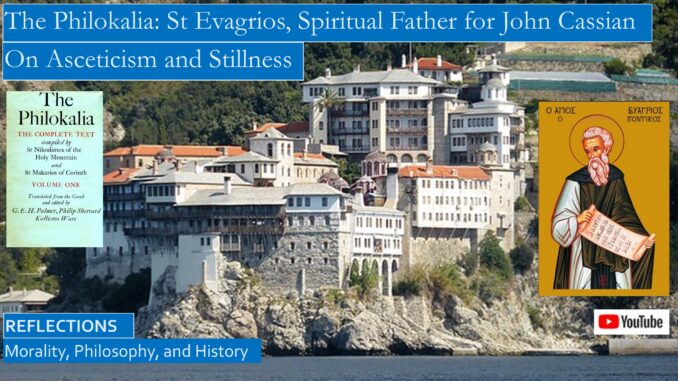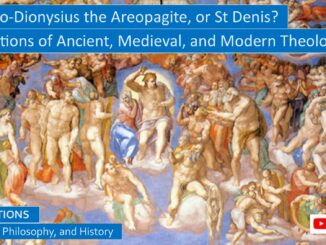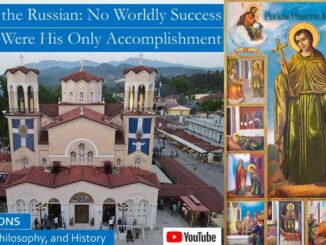
In her essay on Evagrios, Konstantinovsky explores the themes of his Texts on Discrimination of Passions and Thoughts. The monk must “guard and protect the good thoughts in his mind from the evil and demonic ones, like the good shepherd cherishes the sheep, guarding them from the wolves.” The monk is always “guarding the mind’s tranquility and purity.” We allow sin into our soul when we allow our mind to be overwhelmed by an evil passion like lust, hatred, or avarice.
Pure prayer, the highest state of spiritual contemplation, cannot be reached when we are drug into the abyss by our passions. These passions block the grace that brings ascetic contemplation. “Pure luminous prayer is the prize and fruit of the life of stillness, or hesychia.”[1]
YouTube videos:
Philokalia: Evagrios the Solitary, Spiritual Father of St John Cassian, On Asceticism and Stillness
https://youtu.be/UGiqdHht9hY
Philokalia: Evagrios the Solitary, On Passions and Thoughts, Watchfulness, and 153 Texts on Prayer
https://youtu.be/QGkUMYbP-zM
Evagrios Blog 1 http://www.seekingvirtueandwisdom.com/evagrios-the-solitary-blog-1-asceticism-and-stillness/
TEXTS ON DISCRIMINATION OF PASSIONS AND THOUGHTS
Before Jesus started His ministry, after Jesus was baptized by John in the Jordan, Jesus was led into the desert by the Holy Spirit to fast for forty days and nights before he was tempted by the Tempter. To Evagrios, the temptations of Christ as the very same temptation that those who seek to live the ascetic life encounter. How does Satan tempt Christ? Evagrios teaches us, “First, he exhorted Christ to turn the stones into bread; then he promised Him the whole world if Christ would fall down and worship him; and thirdly he said that, if our Lord would listen to him, He would be glorified and suffer nothing in falling from the pinnacle of the temple.”
What were Christ’s responses to these temptations? Christ quotes Scripture three times:
“Man shall not live by bread alone,
but by every word that proceeds from the mouth of God.”
“You shall not tempt the Lord your God.”
”You shall worship the Lord your God
and him only shall you serve.”[2]
Evagrios pairs these three temptations with the demons who fight against those who seek to live the ascetic life, whether they be monks or ordinary Christians living in the world, “demons entrusted with the appetites of gluttony, demons who suggest avaricious thoughts, and demons who incite us to seek the esteem of men.” When we surrender to these temptations and sin, these sins lead to other sins, gluttony leads to unchastity and adultery, avariciousness leads to envy and despair, and finally pride.
The demons tempt us through our passions, they tempt us through our perceptions, they tempt us through our memories of past pleasures that tempt us, through painful memories of those who have harmed us, and if this was true in the days of Evagrios, how much more true it is today when the media bombards us with images of pleasure and pain and cruelty. Evagrios warns us, “all thoughts producing anger or desire in a way that is contrary to nature are caused by demons.” If Evagrios could visit us today, what would he say about the wisdom of Christians attending church on Sundays and watching horror movies or violent movies on Friday nights? Are we inviting demons into our souls to tempt us, to crowd us the compassionate thoughts in our soul? We should guard ourselves against the demons of anger and rancor who seek for us to replay over and over in our mind the wrongs that others have done to us in the past.
Evagrios teaches us, “It is impossible to overcome these passions unless we can rise above attachment to food and possessions, to self-esteem and even to our very own body that the demons seek to attack us. It is essential to imitate people who are in danger at sea and throw possessions overboard because of the violence of the winds and the waves.”
The Evagrios warns us, lest we get too cocky, to be careful that we do not make a show of throwing our possessions overboard “just to be seen doing so by men.” We are not to be like the Pharisee who makes a show of praising God that he is not like the Publican, nor should give alms to men to be seen by them, as Jesus warns. Evagrios warns us that if we make a show of our devoutness we may “get the reward we want,” recognition by men, “but we shall suffer a worse shipwreck, worse than the first, blown off our course by the contrary wind of the demon of self-esteem.”[3]
This reminds me of a recent Christianity Today article that observes that many of the moral scandals of ministers of mega-churches often happen when their ministry is really thriving, and many parishioners look up the pastor. The temptation is to forget their purpose, to allow their busy-ness and the cares of the world to crowd out their own spiritual life and their relationship with their Lord and their family, to forget that the success of their ministry is not their success, that the true measure of their success is not how many people are sitting in the pews but whether their heart is right with the Lord.[4]
Don’t take this observation as a criticism of pastors of mega-churches but rather as a trap that all of us can fall into, for the demons wait for us to let down our guard and proclaim we are not like the publicans over there. Evagrios warns us not to trust in our possessions or our reputation before men, not to be unduly concerned about what we should eat or what should we wear, but that we should always guard the gateway of our soul against the demon of self-esteem, we should always be humble. “In the whole range of evil thoughts, none is richer in resources than self-esteem; for it is to be found almost everywhere, and like some cunning traitor in a city it opens the gates to all the demons.”
We should always be humble, we should always guard against the demon who seeks to make our soul obtuse. Evagrios warns us, “at his approach, the soul departs from its own proper state and strips itself of reverence and the fear of God, no longer regarding sins as sin, or wickedness as wickedness; it looks on judgment and the eternal punishment of hell as mere words; it laughs at the fire which causes the earth to tremble, and while supposedly confessing God, it has no understanding of His commandments.” We must study His commandments, the Law and the Gospel, we must use our intellect to help ensure our salvation, salvation demands effort and work and good daily habits and guarding of thoughts, words, and deeds.
We will not comment on all the points of this wonderful work by Evagrios, as it introduces many topics that will be explored in depth in the rest of the Philokalia and works like St John Climacus, The Ladder of Divine Ascent. We want the reader to discover more golden nuggets as he reads and sifts and contemplates these works in his heart himself.
One chapter in the Ladder of Divine Ascent demonstrates the balance that we see in this work and the Philokalia, this is the chapter that reminds that despair can be seen as a sin, for when we despair we do not trust in the Lord. We see this idea in Evagrios, when he teaches us “that all the demons teach the soul to love pleasure; only the demon of dejection refrains from doing this, since he corrupts the thoughts of those he enters by cutting off every pleasure of the soul and drying it up through dejection.” The danger is the demon of despair “encourages the soul to give up or run away.” We should never give up hope, we should never be disheartened, we should never give up the joy of our salvation.
The best way to conclude these thoughts is to quote the conclusions of this work. “If you long for pure prayer, keep guard over your incensive power; and if you desire self-restraint, control your belly, and do not take your fill even of bread and water. Be vigilant in prayer and avoid all rancor and anger. Let the teachings of the Holy Spirit be always with you; and use the virtues as your hands to knock at the doors of Scripture. Then dispassion of heart will arise within you, and during prayer you will see your intellect shine like a star.”[5]
Evagrios Blog 3 http://www.seekingvirtueandwisdom.com/evagrios-the-solitary-blog-3-extracts-from-the-texts-on-watchfulness/
[1] Julia Konstantinovsky, “Evagrios in the Philokalia of St Macarius and St Nicodemus,” in the Philokalia, A Classic Text of Orthodox Spirituality (New York: Oxford University Press, 2012), p. 189-190.
[2] https://www.biblegateway.com/passage/?search=matthew+4%3A1-10&version=RSVCE
[3] Evagrios, “Texts on Discrimination in respect of Passions and Thoughts,” In the Philokalia, The Complete Text, compiled by St Nikodimos of the Holy Mountain and St Makarios of Corinth, Vol. 1, translated and edited by GEH Palmer, Phillip Sherrard, and Kallistos Ware (London: Faber and Faber, 1979), paragraphs 1-3, pp. 38-39.
[4] http://www.christianitytoday.com/pastors/2017/june-web-exclusives/success-affair.html
[5] Evagrios, Texts on Discrimination in respect of Passions and Thoughts, pp. 38-59.







1 Trackback / Pingback